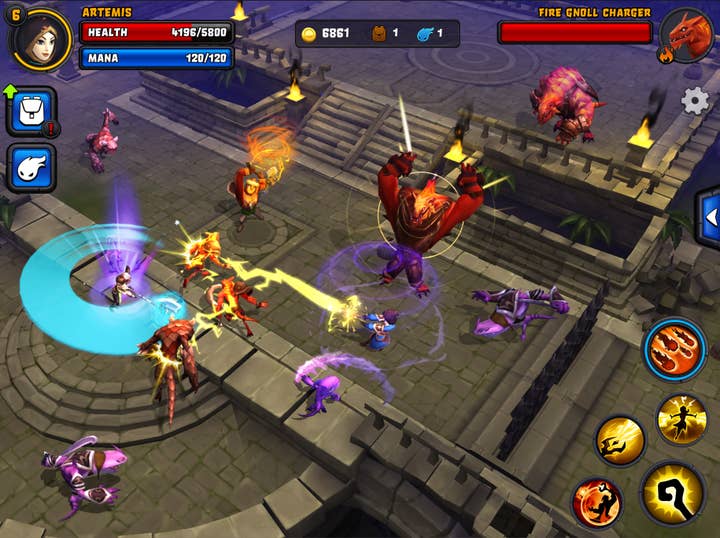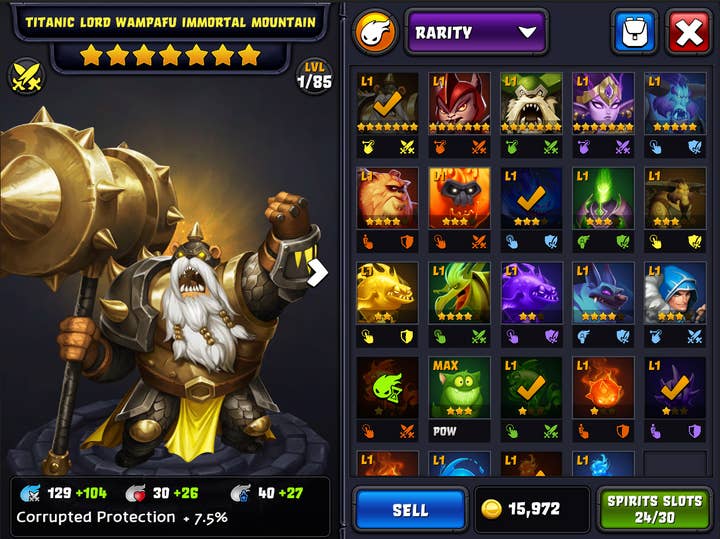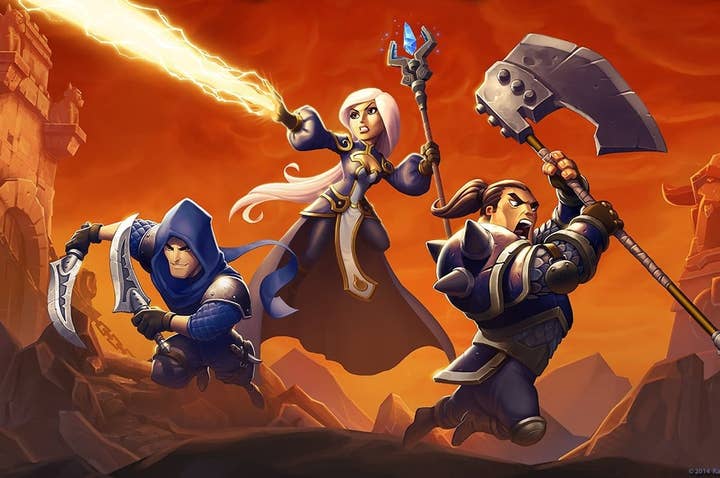Star Wars, Dragon Age and Diablo designers lead new RPG for Kabam
Spirit Lords team explains how it's making a "proper" RPG that's not watered-down
Building a new IP is always a risk for any company, but it's also a huge opportunity. If handled with care, a fledgling new property can blossom into a cherished franchise for years to come. That's precisely the aim free-to-play company Kabam has for its brand-new action RPG Spirit Lords, which launches on mobile tomorrow, April 9.
Kabam has assembled an all-star team that believes in making a deep RPG, not merely a shallow mobile game with RPG elements. Heading up the RPG studio for Kabam is Phil Shenk (Executive Producer), Daniel Erickson (Senior Director of Design) and Danny Keller (Animation Director). Building RPGs runs deep in their blood. Shenk was art director at Blizzard for both Diablo 1 & 2 while Erickson was the creative and design lead at BioWare Austin for Star Wars: The Old Republic, which he helped transition to free-to-play. He also worked on the critically acclaimed Dragon Age: Origins. Danny Keller previously worked in game design for DreamWorks Interactive but more recently he was the Episodic Director for seasons two through six for the oft praised cartoon Star Wars: The Clone Wars.
This isn't the sort of team you'd normally associate with mobile game development, but that's precisely the point. Kabam has seen the core and midcore market growing on mobile, players' expectations are rising, and the demand for an experience as rich as one on PC or console is there.

"The whole premise for Spirit Lords was to make a 'proper' action RPG for mobile, that wasn't a watered-down experience or a compromise. To do this, we had to take a hard look at what was important to the core of dungeon-crawler design, and then figure out how to make them work for players on mobile, and then also make them work in the free-to-play model," Shenk explained to GamesIndustry.biz.
Erickson noted that while there are games with deeper experiences on mobile already, many of them suffered from a lack of direction at the start. "The games that have become popular on mobile are not any less complex than let's say traditional games are. They have just been maybe less planned in their execution. Games have been smaller, something has gotten popular, you stack a whole bunch of stuff on top of it because now the game's exciting, you get more of a Frankenstein approach to it," he said.
"What we're doing is saying, 'Ok, we know the market is there and we know that people are playing complex games... Now, let's take a step back. Let's decide that we're going to make the investment up front and let's actually plan out and make sure what we're building is a sustainable model and a sustainable business and creative side that can be stretched in the future without the franticness that may have come in the past in the mobile industry'."
Spirit Lords' art and animation feels a bit like Clone Wars meets traditional Blizzard design, and while the game's visuals are certainly important, the refreshing thing about the mobile market is that it reinforces gameplay design above all else, Erickson noted.
"People are expecting something that's a little bit different. They're not yelling about whether or not you can see a tank flipping through the air reflected in a single tear that's coming down a guy's face, right? So it's really refreshing in that way"
Daniel Erickson
"It's almost like going back to the beginning," he reflected. "Even before BioWare, I worked at EA and it was a world that had 18 months dev cycles... And you had teams that were not triple digits yet. And I always thought that as games expanded and they got bigger, we were going to do more interesting, more complicated, more outreaching experimental stuff with the games and, although we got a little bit of that, because of the price margins not moving and the cost of technology and the race to go up the art chain, what we actually got in the console/PC world was incredibly thin margins and people getting really scared of doing anything different.
"So a lot of what this has been for me is almost going back to my roots of saying, 'Hey, remember when you could make a game and possibly even learn from that game for the next game because the market hadn't entirely moved on?' When you're taking 5, 6 years to make a game, if that game doesn't do well, your ability to predict where the market's going to be in 6 years from now, if you even have a business left, is so different, whereas on the mobile space - it has all the power... People are expecting something that's a little bit different. They're not yelling about whether or not you can see a tank flipping through the air reflected in a single tear that's coming down a guy's face, right? So it's really refreshing in that way."
That gameplay-first approach is also a byproduct of the mobile market itself. With support required for so many different, older smartphones, you can't get too caught up in pushing polygons. Kabam even supports the iPod, which people are often surprised to hear.

"The nature of the platform keeps us honest. Because you cannot - you're not even allowed to, if you wanted to, and we wouldn't want to - drop off the tail end of the technology. We can't say, 'Hey, you know what? We're not going to make things for an iPhone 4.' That's not even an option. [It's like if console devs said] it still has to run on a PlayStation1. Right? So you might be able to pump the graphics up a little bit for your PlayStation 4, but your base ideas and your basic conceptions can't just be throw hardware power at it because it has to still be a compelling piece back here and the great thing about that window is, although it can be frustrating sometimes when you are trying to do something that's really magical graphically at the time, it makes you actually get into the nuts and bolts core game design and say, no, no the point of this thing is the game itself, not the sort of set dressing," he added.
So what exactly is Kabam doing with Spirit Lords that it believes will make it resonate with the core crowd? Well, for one, it's making combat matter.
"These mobile devices, smartphones, tablets and everything in between are just as powerful as purpose-made handheld gaming devices. Even more powerful in a lot of cases. To me, it's really just a question of reaching out to that core gamer market with the right product," said Shenk. "To-date, many strategy and RPG offerings on mobile have been more focused on what I think of as the 'meta' elements of game design than on the 'direct-action' elements. What I mean by meta is things like resource management, collecting and upgrading items in order to increase stats, picking and choosing units to commit to an offline battle, etc. Direct-action means that the player must be actively engaged in responding to what's happening on the screen in real-time. It takes way more of the player's attention, but it's also often more engaging, or at least engaging in a different way.

"In a lot of mobile RPGs, what you actually do inside of combat doesn't matter very much at all. The direct-action component is just a visual presentation layer that doesn't really do anything," he continued. "Core RPG gamers, the ones that would play games on a PC, a console, or a handheld device like a GameBoy or Vita... I believe they are usually looking for games that are significantly about the direct-action components tied very tightly with the meta components. The direct-action choices they make inside of real-time combat are just as important as the meta part... the skills, weapons, classes that the player chooses before entering a dungeon. To me, this combination is fundamental to reaching a core RPG audience on any platform, and we feel is the big differentiation for Spirit Lords in the mobile market."
Another key aspect, as any RPG lover would tell you, is to immerse players in a universe filled with engaging characters and story. Kabam believes Spirit Lords will scratch that itch even thought it's on mobile.
"In my mind story is much more than just tacking on a narrative... we spent months developing the backstory and the world to make sure there was a purpose for everything in the game. We've got a world bible that outlines what happened in this world from the beginning of time"
Phil Shenk
"Story is important I feel, to create a context for why you're doing what you're doing. In my mind story is much more than just tacking on a narrative... we spent months developing the backstory and the world to make sure there was a purpose for everything in the game. We've got a world bible that outlines what happened in this world from the beginning of time, the wars and heroes and empires that existed way before the time of the game story itself. Since our game is effectively about collecting and harnessing the power the Spirits of the greatest heroes from long ago, this was crucial to make sure it didn't all just feel like random art thrown in a pot," Shenk explained.
"Diablo 1 and 2 were great at creating a sense of place with very spartan dialogue, but a great sense of 'tone' to the world. When I started there however, the actual details of the world were sparse and disconnected...so I spent a long time at Blizzard during the Diablo 2 expansion planning, assembling and creating an expansive world bible that would give future writers and designers an epic roadmap to work with... With Spirit Lords, I wanted to make sure we had all that lore figured out from the start, so we spent a lot of time figuring out the world before we dove into the script itself," he added.
Having someone who directed episodes of The Clone Wars is certainly a bonus for Spirit Lords as well. "I was truly blessed to have been a part of that crew and have the opportunity to direct Star Wars stories alongside George Lucas. It was a childhood dream and I learned a great deal about story, character, world building and pacing. All of these concepts directly apply to any entertainment experience, regardless of the viewers level of interaction," commented Danny Keller.
"I think many times we think of story within a game as merely the words being spoken and overlook how characters interact with their environment and the emotional response that can be generated from a well crafted moment. I think memorable moments, regardless of the medium, is what drives me as a user to download a game, watch a TV show or go to a movie. Spirit Lords is just scratching the surface of what I know Kabam is capable of in an RPG and I am excited about our future and what we can deliver to our players."

Unlike a lot of other mobile titles that use turn-based models, Spirit Lords offers four-player simultaneous online gameplay. And Kabam says Act 1 should offer months of play time. Ultimately, with the games-as-service model becoming necessary in the mobile world, Erickson views Spirt Lords almost as an MMO, from the development perspective.
"It's closer to the MMO concept than it is to the one-off Dragon Age concept because we're not moving the team to something else after this. We're not making a sequel. We're making more Spirit Lords. Act 2 is still going. My dream as an RPG creator has always been to just make a world and camp on it. Just keep telling stories, keep doing more stuff, keep going as long as people are excited," he said. "That means that to hit that level where you can do it you either have to, in a standalone product, have the most amazing breakout hit in mobile history, or have the ability to get your user base so wide that you can make it up in sheer numbers. And that's what attracted me to it... from a developer's side, when you say 20 million people are going to play this game, that's what gets me excited. I want to make awesome games and I want as many people as possible in the world to touch them. And if free-to-play means the gates are open and everybody can come in. Awesome. Then that's the way to go."
If things go the right way for Kabam, who knows, Spirit Lords could become a transmedia property with cartoons, comics, novels and more, but for now the game is all that matters.
"I don't think anybody's trying to put the cart before the horse. For today, it's a game and we want to make a great game. Obviously... having an original IP that's successful is always a big win because you have whatever opportunities come along later for it," Erickson said.

